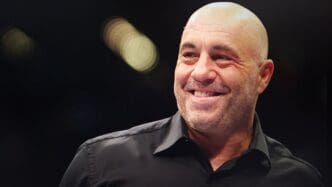Executive Summary
The Story So Far
Why This Matters
Who Thinks What?
Right-leaning podcaster Joe Rogan has publicly defended late-night host Jimmy Kimmel following his recent suspension and return to air, criticizing the notion of government interference in comedic expression. Rogan, an influential supporter of President Donald Trump during the 2024 campaign, stated on his podcast that the government should never dictate what comedians say and warned conservatives supporting such actions that they were “crazy” and could eventually become targets themselves. Kimmel’s show was briefly taken off air by Disney’s ABC last week over comments he made regarding the suspected killer of conservative activist Charlie Kirk, sparking a debate on free speech.
Kimmel’s Suspension and Return
Kimmel’s show was suspended for nearly a week following his remarks concerning the alleged killer of Charlie Kirk, a conservative activist. The move by Disney’s ABC raised significant questions about the boundaries of free speech and the First Amendment in public discourse. The show returned to broadcast on Tuesday night, ending a nearly weeklong standoff.
Rogan’s Stance on Free Speech
On his podcast, Rogan directly addressed the controversy, emphasizing his belief that government entities should not be involved in censoring comedians. He specifically cautioned conservatives who might endorse such interventions, arguing that supporting such behavior would inevitably lead to its application against their own speech.
Rogan stated, “I definitely don’t think that the government should be involved ever in dictating what a comedian can or cannot say in a monologue.” He further elaborated, “If people on the right are like ‘yeah, go get ’em,’ oh my God, you’re crazy. You’re crazy for supporting this because this will be used on you.”
Origin of the Controversy
The initial controversy stemmed from Kimmel’s comments last week, where he suggested the MAGA movement was attempting to distance itself from the alleged killer of Kirk for political gain. These remarks fueled a broader discussion about the politicization of comments surrounding Kirk’s murder.
Upon his return, Kimmel delivered an emotional monologue, urging viewers to resist what he described as President Trump’s threats. He clarified that his intention was never to “make light” of a young man’s murder or to “blame any specific group” for the tragedy.
Broader Political Context
The incident highlights the increasingly politicized nature of public commentary, particularly concerning sensitive events like Kirk’s murder. High-profile campaigns have emerged, pressuring employers to dismiss individuals whose comments are perceived as unflattering or critical of Kirk.
This episode also aligns with President Trump’s broader history of confronting media organizations, especially those he perceives as critical. Notably, Trump had previously filed a $15 billion defamation lawsuit against The New York Times, which a federal judge subsequently rejected for not adhering to federal civil complaint rules.
Key Takeaways
The exchange between Rogan and Kimmel, set against the backdrop of a contentious political climate and ongoing debates over free speech, underscores the challenges of navigating public discourse. It highlights the tension between comedic expression, political commentary, and the perceived role of government and media companies in regulating speech.








